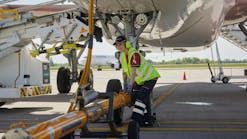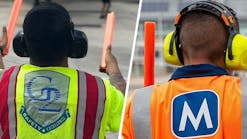Detroit Metro Airport Rolls Out Autonomous Wheelchairs to Transport Passengers
Travelers with mobility issues or who have trouble walking long distances will have another option to get to their gates under a new pilot program unveiled Monday at Detroit Metro Airport's McNamara terminal: autonomous wheelchairs.
For 90 days, 10 chairs, called WHILL devices, will be available to travelers as part of a partnership with Unifi. The chairs can drop off passengers at specific gates without an employee navigating them and stop if an obstacle is in the way.
The program is intended to improve the customer and employee experience simultaneously, said Guatam Thakkar, Unifi's CEO, at a press conference at the airport's McNamara terminal recently.
"We all know that technology is fundamentally changing ... not just at the airport or anywhere else, even in our household technology has significantly changed the way we work," Thakkar said. "We want to see how this technology can provide, or not provide, passenger greater independence and how it can reduce the wait time for the passenger.
"We want to see how this technology can alleviate some of the strain on which we have on some of our employees, in particular, during the peak times," he said.
The chairs are assigned to passengers on-site after employee screening and are currently based in the center of the terminal past the security checkpoint. An employee will take a traveler from security to the autonomous chairs. Once the chair has dropped off the passenger to its gate, it automatically returns to its base to wait for the next passenger.
Each chair travels at the same speed as the airport's moving walkway and plays a tune as it carries passengers. It stops when met with an obstacle, or person, in its pathway. According to a release, the WHILL devices can be paused at any time by the passenger and has an emergency stop button. Each chair also is equipped with pre-mapped routes and backup systems.
Linda Teets of Cleveland took a chair to her gate Monday morning. She was on her way to Miami and said she hope the autonomous chairs won't negatively impact employees who manually transfer passengers.
"Anything to help progress and make it easier for folks who have to rely on this kind of help," said Teets, 66.
More than 100 WHILL devices are currently deployed at airports across the country and have completed more than 400,000 autonomous rides to date. The program at DTW is supported by a grant from the Office of Future Mobility and Electrification, a division of Michigan Economic Development Corporation and part of the MI Mobility Funding Program.
But not everyone was happy with the speed of the new autonomous chairs at DTW, or not being unable to ask an employee to stop if needed.
Valarie Bankston of California took a wheelchair from the center of the terminal to one end, gate A38 to A6. She was going back to her home state when an airport employee escorted her from a manual wheelchair to the autonomous chair.
"This is really slow and it doesn't have any assistant if I have to go to the restroom. It doesn't stop for you to get anything. It just goes," Bankston said while riding.
Bankston, 68, wanted to stop at a store and was concerned for older travelers who'd need more assistance than she does. She thought the manual wheelchair pushed by an employee would be quicker.
"What if somebody was in a rush? This is not accessible to get them there," she said. "They say you can see an agent or worker. I don't see nobody. I haven't seen anybody yet to ask anything.
"I have my daughter with me. Some people don't have anybody with them. ... I wouldn't want to do this (again)."
Later this year, autonomous wheelchairs also will be introduced at the Warren Cleage Evans Terminal.
After the 90-day pilot program ends, Tim Fisher, director of Unifi's aviation services, said the company will utilize feedback from passengers and employees in hopes of making the chairs a permanent fixture at the mile-long airport.
During holidays, customers experience longer wait times and may even miss flights. Fisher said the company hopes customers will wait less and employees can be freed up to work with travelers who need more attention.
"It's not just about faster service but it's about better service, so that's going to be a part of the evaluation," Fisher said. He also said worker assistance and employee stations throughout the terminal may occur. The company may also adjust the number of chairs depending on demand during the pilot program.
Fisher said the autonomous service may not be suitable for travelers in a hurry, accompanied by a pet, or who need to carry things such as an oxygen canister.





